
The bulbuls are a family, Pycnonotidae, of medium-sized passerine songbirds, and includes the greenbul, brownbul, leaflove, and bristlebill. The family is distributed across most of Africa and into the Middle East, tropical Asia to Indonesia, and north as far as Japan. A few insular species occur on the tropical islands of the Indian Ocean. There are over 150 species in 32 genera. While different species are found in a wide range of habitats, the African species are predominantly found in rainforest, whereas Asian bulbuls are predominantly found in more open areas.

True thrushes are medium-sized mostly insectivorous or omnivorous birds in the genus Turdus of the wider thrush family, Turdidae. The genus name Turdus is Latin for "thrush". The term "thrush" is used for many other birds of the family Turdidae as well as for a number of species belonging to several other families.

The red-whiskered bulbul, or crested bulbul, is a passerine bird native to Asia. It is a member of the bulbul family. It is a resident frugivore found mainly in tropical Asia. It has been introduced in many tropical areas of the world where populations have established themselves. It has a loud three or four note call, feeds on fruits and small insects and perches conspicuously on trees. It is common in hill forests and urban gardens.
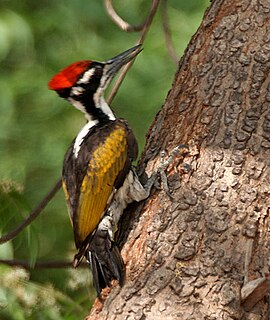
Chrysocolaptes is a genus of birds in the woodpecker family Picidae that are found in South and Southeast Asia.
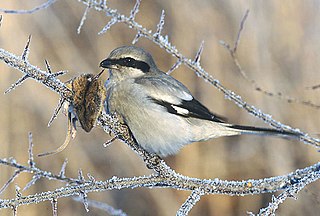
Lanius, the typical shrikes, are a genus of passerine birds in the shrike family Laniidae. The majority of the family's species are placed in this genus. The genus name, Lanius, is derived from the Latin word for "butcher", and some shrikes are also known as "butcher birds" because of their feeding habits. The common English name "shrike" is from Old English scríc, "shriek", referring to the shrill call.
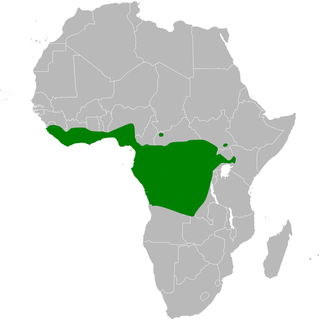
Baeopogon is a genus of passerine birds in the bulbul family, Pycnonotidae.

Hypsipetes is a genus of bulbuls, songbirds in the family Pycnonotidae. Most of its species occur in tropical forests around the Indian Ocean. But while the genus is quite diverse in the Madagascar region at the western end of its range it does not reach the African mainland.
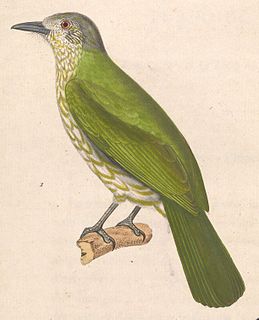
The Javan bulbul is a songbird species in the bulbul family. It is the type species of the genus Ixos. It is endemic to the island of Java in Indonesia in its natural habitat of subtropical or tropical moist montane forests. It is not considered a threatened species by the IUCN.
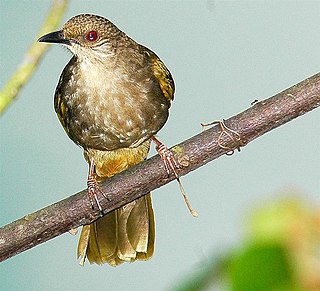
Pycnonotus is a genus of frugivorous passerine birds in the bulbul family Pycnonotidae.

The crested finchbill is a species of songbird in the bulbul family, Pycnonotidae. It is found in south-eastern Asia from China and India to Indochina.

The collared finchbill is a species of songbird in the bulbul family, Pycnonotidae. It is found in China, Taiwan, Japan and Vietnam.

The hairy-backed bulbul is a songbird species in the bulbul family, Pycnonotidae. It is the sole species contained within the monotypic genus Tricholestes. It is found on the Malay Peninsula, Sumatra, and Borneo. Its natural habitat is subtropical or tropical moist lowland forests.

The orangequit is a species of passerine bird in the tanager family Thraupidae and is the only member of the genus Euneornis. It is endemic to Jamaica where its natural habitats are subtropical or tropical moist lowland forests and heavily degraded former forest.

Gecinulus is a genus of birds in the woodpecker family Picidae. The species are found in South and Southeast Asia.

Calendulauda is a genus of lark in the family Alaudidae. Established by Edward Blyth in 1855, it contains eight species.

Khonoma Nature Conservation and Tragopan Sanctuary or KNCTS is a conservation reserve and a protected area in the Kohima district of the state of Nagaland in India. It is about 18 kilometres (11 mi) west of the capital of Nagaland, Kohima. The total area notified under this park is around 25 square kilometres (9.7 sq mi); some of villages and hamlets are adjacent to this park: Khonoma, Mesoma, Dziilike.
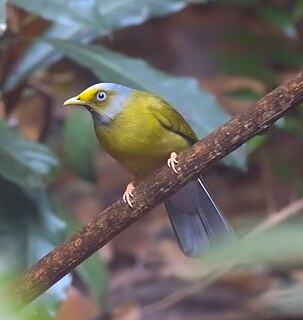
The genus Brachypodius is a small genus of songbirds in the bulbul family, Pycnonotidae.

Rubigula is a genus of Asian passerine birds in the bulbul family, Pycnonotidae.

Laticilla is a genus of small passerine birds in the family Pellorneidae. Members of the genus are found in Pakistan, Nepal, India and Bangladesh.

Gymnoris is a genus of passerine birds in the sparrow family Passeridae. Three species are found in Africa while the yellow-throated sparrow ranges from Turkey to India.





















